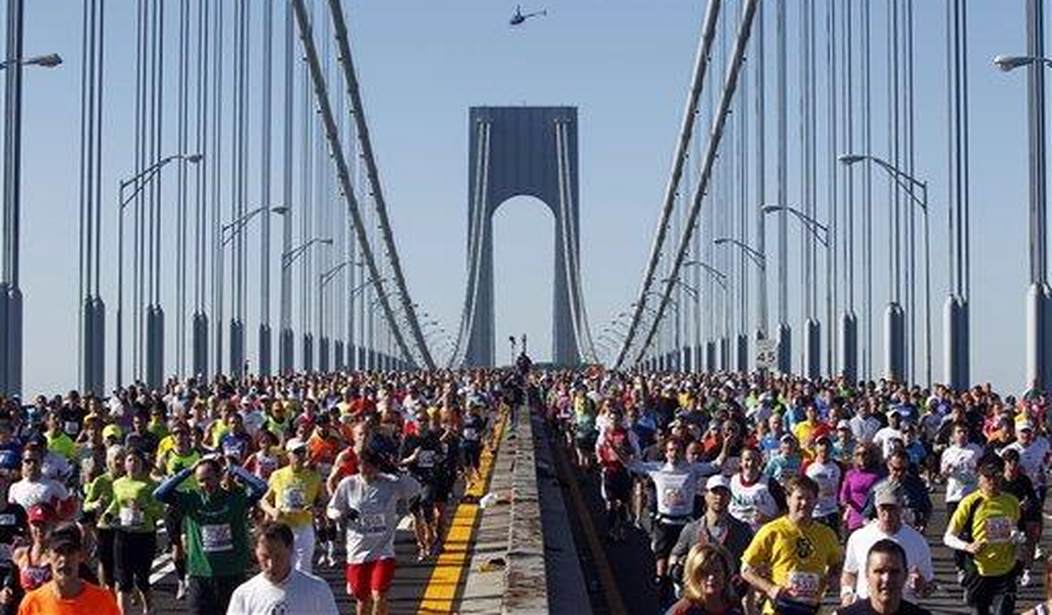The New York City Marathon is the largest and most high-profile in the world.
What do you do if you're an official from the New York City Transit agency? Try to shake them down, of course—in this case to the tune of $750,000 to pay for the lost toll revenue they claim comes from closing off the Verrazzano Bridge to vehicular traffic during the test of endurance. Runners have used both decks of the bridge for the last 36 years—and organizers claim a report shows the spectacle generates an estimated $427 million from tourism, tax revenues, and overall economic activity. That should more than make up for the lost toll revenue, they argue.
My first thought on reading about this cash grab—the bridge normally pulls in $750,000 in a relatively short period of time?! Wow. No wonder living in Manhattan is so expensive.
Oh, and by the way, the event even made an additional $1.1 million for the MTA with record-high ridership on race day in 2023, one outlet's analysis shows.
Has the @MTA lost its mind? The NYC marathon is a major tourism event that drives a ton of economic benefit to the city. Why would they actively work to make it unattractive to runners? Would we rather they skip NY and go to Boston, DC or SF instead?https://t.co/HSBRPqPDBn
— Melissa DeRosa (@melissadderosa) April 3, 2024
Officials from the race argue that such a huge fee would have significant negative consequences for their event:
“The impact of MTA’s request would represent a material change to the cost structure and would require an increase to how much runners pay to run the Marathon, making it less affordable for local runners and those who travel to New York City from around the world—both of whom contribute hundreds of millions of dollars to the City’s and State’s economy,” Crystal Howard, a spokesperson for the organization, said in an emailed statement.
She said the organization has repeatedly asked the MTA to provide data to back up their claim of $750,000 in lost revenue loss but have not received it.
Ironically, the city could also make up for the loss in toll revenue quite easily, according to critics: how about enforcing a law now and then?
But, critics slammed the MTA for giving the marathon a run for its money, when the system lost $690 million to fare and toll evasion in 2022 — with $46 million in toll-dodging on bridges and tunnels alone.
“They can find that money in nine hours if they enforce the law,” Staten Island Borough President Vito Fossella told The Post.
Staten Island prez slams MTA plan to charge NYC Marathon $750,000 toll: ‘They can find that money in 9 hours’ https://t.co/UCiBiqrcQg pic.twitter.com/CLzYzREnaq
— New York Post Metro (@nypmetro) April 3, 2024
So far, the city isn't bending, and it has even resorted to hard-ball tactics like refusing access to one of the bridge's decks if the marathon doesn't fork over the cash:
As the negotiations have unfolded, the MTA initially threatened that runners — who start the marathon on Staten Island — would only be allowed to use the darker lower deck of the bridge for the 26.2-mile race if organizers don’t pay up.
Officials backtracked slightly, though, in recent weeks by saying marathon organizers could have their pick of the upper or lower level for the race — but not both.
Why would NYC be making such a ham-handed attempt to wring out almost one million bucks from an event that brings it worldwide notice and hundreds of millions in revenue? Perhaps it's because they're stretched thin due to Biden's illegal alien crisis.
Organizers are asking Gov. Kathy Hochul (D) to step in and help. In the meantime, it's a bad look for the Big Apple, and just comes across like another money-grabbing scheme from a blue city.













Join the conversation as a VIP Member